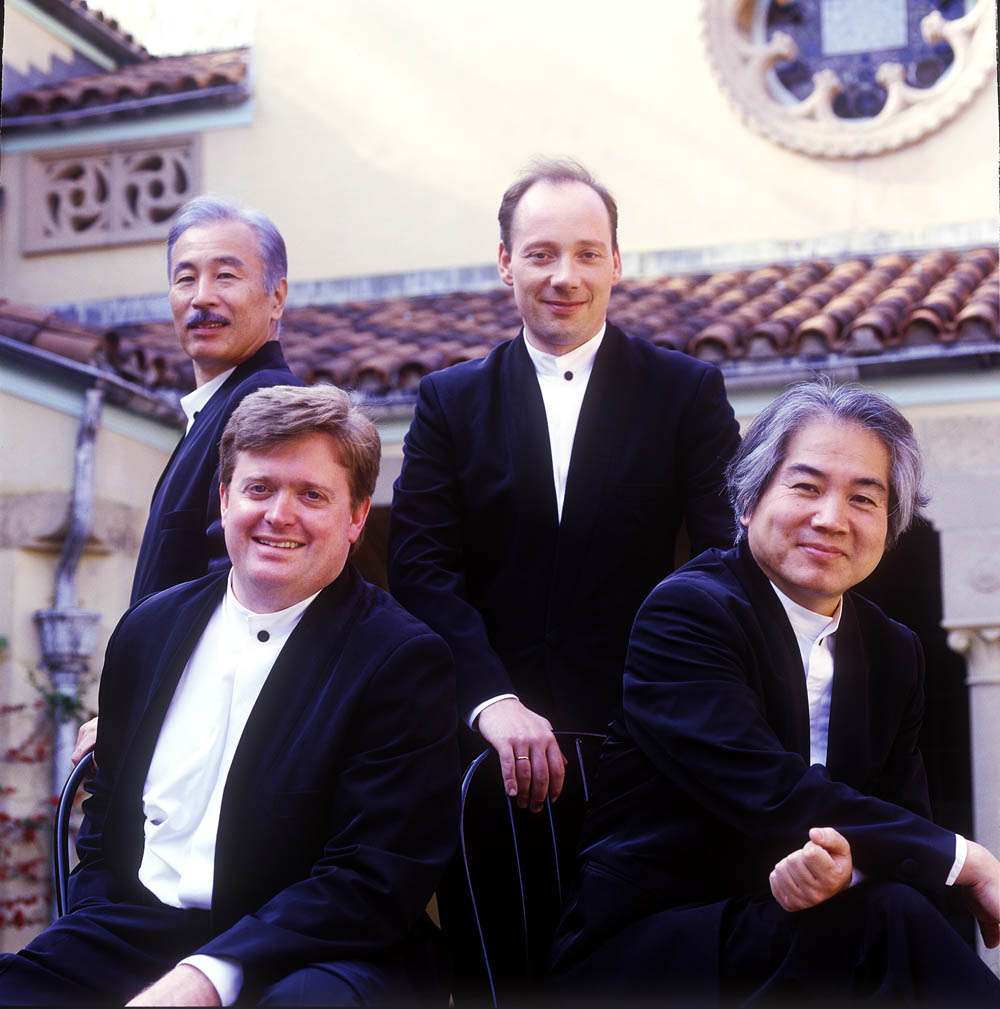|
Back
Hails and Farewells New York
Therese L. Kaufman Auditorium
01/26/2013 -
Josef Haydn: String Quartet in G Minor (“The Horseman”), Opus 74, No. 3
Lera Auerbach: String Quartet No. 6 (“Farewell”) (U.S. Premiere)
Béla Bartók: String Quartet No. 4
Tokyo String Quartet: Martin Beaver, Kikuei Ikeda (Violins), Kazuhide Isomura (Viola), Clive Greensmith (Cello)

The Tokyo String Quartet(© J. Henry Fair)
Say it isn’t so. Over the past four decades, the artistry of the Tokyo String Quartet has been getting better and better. While the musicians have changed (only violist Kazuhide Isomura was in the original ensemble) gorgeous sound, their unflashy musicality and their precision have been heard around the world. Yet now, they are giving their farewell season?
No, they aren’t disbanding, and in fact will be quartet-in-residence in various universities, teaching, perhaps performing individually. After last night’s performance, and an exceptionally full worldwide farewell tour, I shouldn’t doubt that they will be performing together again.
While all their performances are celebratory, I have one objection. The Tokyo String Quartet probably has the most valuable set of Stradivari in the world, in fact, three of the instruments upon which Paganini himself performed. While not realizing this until reading the program notes, I had been so dazzled by the sounds which were produced, that structures, the complex counterpoint, even the simplest melodies were hidden. Like the warrior in the Bhagavad Gita, who is so startled by the true nature of the Godhead that he asks it to go back to mere Krishna, I wanted to tell them that such beauty was inhuman.
The reality is that the Tokyo String Quartet is very human indeed. In fact, one was aware constantly that, with all the precision of playing, they never ignored the emotion of the music.
The first of the three pieces, Haydn’s “Horseman” quartet (named, not by Haydn, for the galloping rhythm in the finale) was not only played with transparency–one marveled at the complex counterpoint of the first and last movements–but it had a sunniness, an unquestionable joy in each measure. The trick was that this was, until the final measures, in a minor key. But from the first unison melody through that ersatz yodeling passage, Papa Haydn was obviously having fun with his players (which must have included himself).
One would have thought the finale, Bartók’s Fourth Quartet would have been a contrast, with dissonances, slicing bows, all the string tricks which Haydn couldn’t have dreamed of. That wasn’t entirely true. Some quartets do indeed slash through this opening movement, but the Tokyo String Quartet gave a lyrical, almost a melodic performance here. Yes, this was dissonant hard-driving Bartók, but the Tokyo String Quartet must pride themselves on sonority, on clarity, and one was hardly frightened by the Bartók persona.
The two scherzos also had that joy of playing. The second movement, which can sound like a swarm of biting insects, here became a muted nocturne. Bartók certainly was painting his night picture, but these sounds could have included wing fluttering, branch-waving, and the muted sounds from far away. For the “Allegro pizzicato” movement, first violinist Martin Beaver pulled so hard on that snapping string, one thought it might have angrily snapped back at him.
The core “Non troppo lento” had an intense solo by cellist Clive Greensmith, followed by others in this great ensemble. Needless to say, the four players pulled out every string trick in the book for the finale. It was percussive, melodic, and a dazzling demonstration of the group’s greatness.
The United States premiere of Lera Auerbach’s “Farewell” Sixth Quartet (dedicated to the Tokyo String Quartet and co-commissioned by the 92nd St Y itself), bore more than passing similarity to the Bartók. The Prologue (the piece has Prologue and Epilogue, nothing in between) had the same slashing, massive dissonances, this time slashing over all four strings of the First Violin simultaneously. It was harsh, jagged, played with apparent razor-sharp (and razor-cutting) accuracy, first by Mr. Beaver, followed by Messrs Ikeda, Isomura and Greensmith. Underneath this, Ms. Auerbach sets in motion some folkish tunes, giving a base to the work.
It was fascinating music, but for some reason, the 15 minutes sounded far longer than Haydn’s 23-minute Quartet. Perhaps Haydn didn’t wear his heart on his sleeve, perhaps too many slash-and-burn notes were exhausting.
Of course the Tokyo String Quartet knew what they were doing from start to finish. And Ms. Auerbach, a poet as well as composer-pianist, perhaps summed up her music in lines quoted by Harry Haskell, the excellently detailed annotator:
The composer, she writes, “gathers sounds/in the darkness, like a blind-man/picking the wild flowers/guided only by their fragrance.”
Harry Rolnick
|